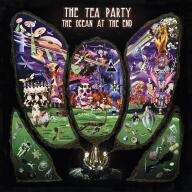The band formed in 1990 around the talents of Jeff Martin (guitars, vocals), Stuart Chatwood (bass, vocals), and Jeff Burrows (drums, percussion), all of whom had played in various groups together during their teenage years in Windsor. Adopting their moniker from the legendary hash sessions of Beat generation poets Allen Ginsberg, Jack Kerouac, and William Burroughs, the Tea Party released their eponymous debut album in 1991. Steeped in the dark, psych-blasted blues-rock of the Doors and Led Zeppelin and produced by Martin, who would go on to helm all of the group's future albums, the self-released record caught the attention of EMI, which quickly added the trio to their roster. 1993's Splendor Solis marked their debut for the major label, and the LP found favor both at home and in Australia, where the epic single "Save Me" became a hit. The group further honed their unique blend of hard rock, mystical open-tunings, sitar, and Middle Eastern rhythms on 1995's Edges of Twilight, which like its predecessor, went double platinum at home, and in Australia as well. Continuing to absorb influences, the trio adopted a darker, more industrial tone on 1997's Transmission, which maintained the dervish-like esthetic of prior outings while introducing sequencers, samples, and loops. The album went double-platinum once again and earned the group their first Juno nomination. The Tea Party continued to straddle the nexus of alternative hard rock and orchestral worldbeat on 1999's chart-topping Triptych, which yielded their first number one single with the evocative "Heaven Coming Down."
Looking to break into the U.S. market, Atlantic issued the retrospective Tangents: The Tea Party Collection in 2000, but American audiences were already too late to the party, having only been exposed to the band's last two efforts, and with minimal promotion to boot. The trio returned to their blues-rock roots on 2001's Interzone Mantras, which eschewed the studio opulence of Transmission and Triptych for a style that hewed closer to the raw passion of their live performances. They split the difference on 2004's well-received Seven Circles, which retained its predecessor's vitality while adding back in some electronic elements, and would serve as the last Tea Party transmission for a decade.
The group officially disbanded the following year, with Martin citing creative differences and embarking on a solo career and Chatwood and Burrows continuing to apply their talents to other projects. In 2011, the Tea Party re-formed for a Canadian tour, and two years later, they announced that they were decamping to Australia to begin work on a new studio album. The resulting Ocean at the End, which featured guest spots from Jethro Tull's Ian Anderson and Asleep at the Wheel's Lucky Oceans, arrived in 2014 and quickly climbed to the upper echelons of the Canadian and Australian charts. The Tea Party spent the next few years on the road, returning to the studio in 2019 for the Black River EP. Two years later, they released the effervescent single "Summertime" ahead of their cross-country Saints and Sinners Tour, which marked their 30th anniversary as a band. That track, as well as the fiery "Black River," appeared on the band's ninth studio LP, Blood Moon Rising, later that year. ~ James Christopher Monger, Rovi


















